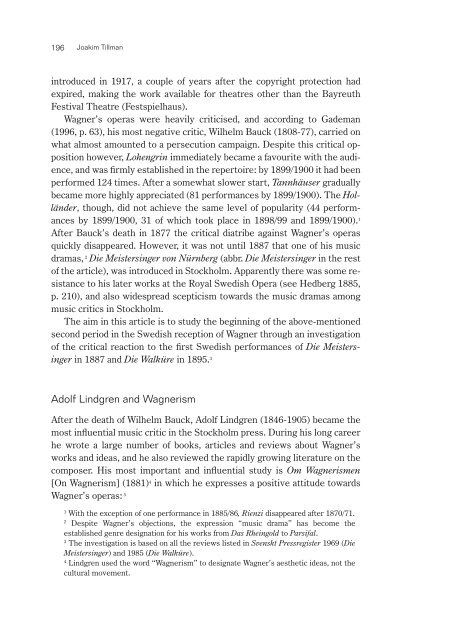Opera on the Move in the Nordic Countries during the Long 19th ...
Opera on the Move in the Nordic Countries during the Long 19th ...
Opera on the Move in the Nordic Countries during the Long 19th ...
Create successful ePaper yourself
Turn your PDF publications into a flip-book with our unique Google optimized e-Paper software.
196 Joakim Tillman<br />
<strong>in</strong>troduced <strong>in</strong> 1917, a couple of years after <strong>the</strong> copyright protecti<strong>on</strong> had<br />
expired, mak<strong>in</strong>g <strong>the</strong> work available for <strong>the</strong>atres o<strong>the</strong>r than <strong>the</strong> Bayreuth<br />
Festival Theatre (Festspielhaus).<br />
Wagner’s operas were heavily criticised, and accord<strong>in</strong>g to Gademan<br />
(1996, p. 63), his most negative critic, Wilhelm Bauck (1808-77), carried <strong>on</strong><br />
what almost amounted to a persecuti<strong>on</strong> campaign. Despite this critical oppositi<strong>on</strong><br />
however, Lohengr<strong>in</strong> immediately became a favourite with <strong>the</strong> audience,<br />
and was firmly established <strong>in</strong> <strong>the</strong> repertoire: by 1899/1900 it had been<br />
performed 124 times. After a somewhat slower start, Tannhäuser gradually<br />
became more highly appreciated (81 performances by 1899/1900). The Holländer,<br />
though, did not achieve <strong>the</strong> same level of popularity (44 performances<br />
by 1899/1900, 31 of which took place <strong>in</strong> 1898/99 and 1899/1900). 1<br />
After Bauck’s death <strong>in</strong> 1877 <strong>the</strong> critical diatribe aga<strong>in</strong>st Wagner’s operas<br />
quickly disappeared. However, it was not until 1887 that <strong>on</strong>e of his music<br />
dramas, 2 Die Meisters<strong>in</strong>ger v<strong>on</strong> Nürnberg (abbr. Die Meisters<strong>in</strong>ger <strong>in</strong> <strong>the</strong> rest<br />
of <strong>the</strong> article), was <strong>in</strong>troduced <strong>in</strong> Stockholm. Apparently <strong>the</strong>re was some resistance<br />
to his later works at <strong>the</strong> Royal Swedish <str<strong>on</strong>g>Opera</str<strong>on</strong>g> (see Hedberg 1885,<br />
p. 210), and also widespread scepticism towards <strong>the</strong> music dramas am<strong>on</strong>g<br />
music critics <strong>in</strong> Stockholm.<br />
The aim <strong>in</strong> this article is to study <strong>the</strong> beg<strong>in</strong>n<strong>in</strong>g of <strong>the</strong> above-menti<strong>on</strong>ed<br />
sec<strong>on</strong>d period <strong>in</strong> <strong>the</strong> Swedish recepti<strong>on</strong> of Wagner through an <strong>in</strong>vestigati<strong>on</strong><br />
of <strong>the</strong> critical reacti<strong>on</strong> to <strong>the</strong> first Swedish performances of Die Meisters<strong>in</strong>ger<br />
<strong>in</strong> 1887 and Die Walküre <strong>in</strong> 1895. 3<br />
Adolf L<strong>in</strong>dgren and Wagnerism<br />
After <strong>the</strong> death of Wilhelm Bauck, Adolf L<strong>in</strong>dgren (1846-1905) became <strong>the</strong><br />
most <strong>in</strong>fluential music critic <strong>in</strong> <strong>the</strong> Stockholm press. Dur<strong>in</strong>g his l<strong>on</strong>g career<br />
he wrote a large number of books, articles and reviews about Wagner’s<br />
works and ideas, and he also reviewed <strong>the</strong> rapidly grow<strong>in</strong>g literature <strong>on</strong> <strong>the</strong><br />
composer. His most important and <strong>in</strong>fluential study is Om Wagnerismen<br />
[On Wagnerism] (1881) 4 <strong>in</strong> which he expresses a positive attitude towards<br />
Wagner’s operas: 5<br />
1 With <strong>the</strong> excepti<strong>on</strong> of <strong>on</strong>e performance <strong>in</strong> 1885/86, Rienzi disappeared after 1870/71.<br />
2 Despite Wagner’s objecti<strong>on</strong>s, <strong>the</strong> expressi<strong>on</strong> “music drama” has become <strong>the</strong><br />
established genre designati<strong>on</strong> for his works from Das Rhe<strong>in</strong>gold to Parsifal.<br />
3 The <strong>in</strong>vestigati<strong>on</strong> is based <strong>on</strong> all <strong>the</strong> reviews listed <strong>in</strong> Svenskt Pressregister 1969 (Die<br />
Meisters<strong>in</strong>ger) and 1985 (Die Walküre).<br />
4 L<strong>in</strong>dgren used <strong>the</strong> word “Wagnerism” to designate Wagner’s aes<strong>the</strong>tic ideas, not <strong>the</strong><br />
cultural movement.
















